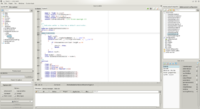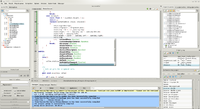Coedit
Coedit is a free, open source, multi-plateform IDE dedicated to the D programming language, its compilers, libraries and tools.
Its name is the contraction of compile and edit.
Development aspects
The software is being developed since June 2014 but the idea is older as shown by a NG discussion in February 2013. The development started on Windows and the linux version was barely tested. Since September 2015 this is the opposite, linux is the main development platform. While in the past Coedit was more used under Windows since the third version the download statistics show that it's more used under linux.
Coedit has the particularity of being written in Object Pascal. It takes advantage of the Lazarus development platform, its visual component library, the RAD concept and the Synedit code editor component. Some of the tools used in background are written in D. The setup program is also a D program that's compiled directly in Coedit.
Each major version is named gold and comes with new features. They are followed by several regular updates with mostly bug fixes and improvements but also minor new features. The first major version was released on June 2015 and the second on February 2016. A third version was released on March 2017.
Features and tooling
Since the beginning, Coedit implements a system of runnable module. It allows to edit, compile and run a D module without typing a command line and without saving a file. A library manager allows the runnable modules to use static libraries, still without specifying any compiler parameter.
The feature set is similar to any other IDE. Most of the IDE-grade features (completion, hints, code navigation) are provided by DCD. Other background tools used includes DUB, Dscanner, dfmt. A last tool written especially for Coedit Dastworx (D AST works) provides other IDE features such as the list of the symbol declared in a module, the list of the TODO comments, the Halstead metrics, the import list. These features are based on the libdparse library.
All the D compilers are supported. This is obvious for the DUB projects since the build tool allows to select a particular compiler. Coedit also implements its own project format. It is based on the DMD command line interface so LDC and GDC are supported through the LDMD2 and the GDMD bridges.
Visual debugging is supported since version 3, using GDB, but only for the POSIX platform since DMD for win32 still produces OMF objects and debugging information that GDB doesn't recognize.
Anecdotes
- In a HackerNews comment, the author has described Coedit as a GUI with a lot of piped sub-processes under the hood.
- The project was briefly deleted during Fall 2015. The first issue created on Github is actually related to the unrecoverable losses caused by the deletion of a repository (issues, releases).

